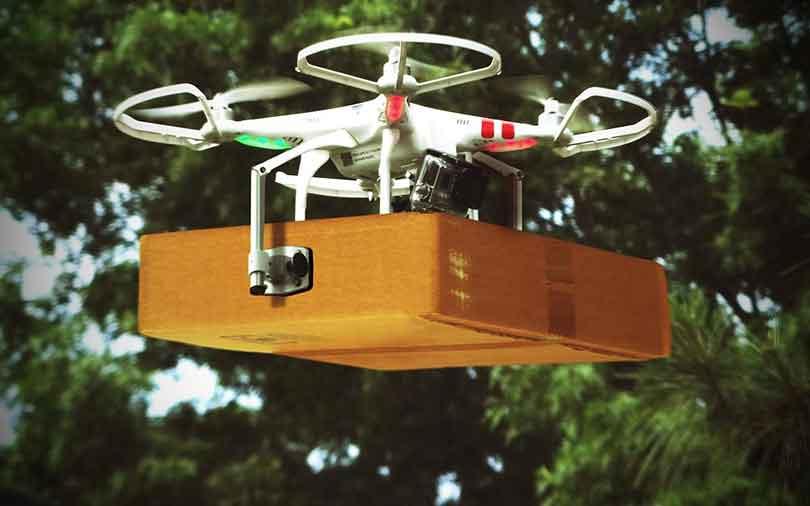Twenty-six-year-old Abhishek Jena, a self-taught electrical engineer, just finished a crash course in drone development. Armed with the recently acquired knowledge, he rushed to the Noida office of drone startup Johnnette Technologies.
Jena met Johnnette's CEO John Livingstone, and sought guidance on opening a drone services firm catering to videography, wedding photography, and telecom tower inspection.
Jena is not alone. Livingstone told VCCircle that scores of youngsters turn up at his office to either learn how to fly drones, or to do research and development. "We see at least 20 people turn up every month to learn more about drones so that they can either open their own venture or partner with us," Livingstone said.
The rising interest in the space has led the Directorate General of Civil Aviation (DGCA) to come up with draft regulations for unmanned aerial vehicles, which will enable commercial use of drones for tasks like photography, doorstep delivery and even passenger transport. Besides, the move is aimed at clipping wings of rogue drones, which pose a security threat and could even result in accidents.
"The new rules will make sure that the skies are not filled with rogue drones, reduce chances of accidents and keep civilians safe," says Aakash Sinha, CEO of industrial drone maker Omnipresent Robot Tech.
At the same time, regulation will bestow legal status on drones.
The bigger question, however, is whether the draft rules will give a leg-up to the fledgling sector and, consequently, open a window of opportunity for ventures in the space.
India's drone market
Currently, rules allow only defence forces, law enforcement agencies and select government firms to use drones, but that hasn't stopped civilian drones from taking off into Indian skies. Media reports suggest that over the past two years, Indians have spent close to Rs 40 crore buying civil drones, including toy drones.
Drone startups in the country have already been working with oil and gas, telecom, cement, infrastructure and utility companies. Their use cases range from land-mapping to diagnostic checks of furnaces and telecom towers, among others.
“We have been working with the biggest oil and gas companies and large private telecom companies to help them save time and costs,” says Sinha.
Shobhit Jain, an executive at Bangalore-based Skylark Drones, says the startup has been working with the Karnataka government, L&T and Alstom, among others, to monitor and track progress of big infrastructure projects.
Most companies, Sinha explains, don't want to buy drones but are interested in the service model. "They would need to train people to work them in industrial environments, which is a considerable expense. We currently get business of Rs 5-10 lakh every month working on the service model," he says.
Skylark's Jain says the startup's cost of service ranges from a few million rupees to half a crore for large infrastructure projects.
Neil Gokhale, head of engineering at aerial cinematography startup Quidich Innovation Labs, says contracts range from Rs 10 lakh to upwards of a crore for a three-month to 12-month contract.
The sector's potential, however, isn't limited to the service model. Manufacturers are seeing traction, too, even though sales are largely limited to defence forces and law enforcement.
"We are manufacturing 25 drones a month but soon will scale to 100, with a plan to get into the toy category later," Sinha adds.
Livingstone's Johnnette currently makes five drones a month, and expects to scale this number to 15 in near future.
New draft rules
The DGCA had released a draft regulation paper on drones in 2016, but it never came into effect. The new draft policy, in fact, builds on the earlier one. It extends the scope of the earlier laws and lists out forms for applying for a unique identification number (UIN) for drones, an unmanned aircraft operator permit (UAOP), and seeking permission for a drone flight.
The draft rules propose that permissions for each drone flight include a valid UIN, UAOP, a notification to local authorities, and adherence to norms regarding take-off and landing zones, collision avoidance, noise abatement, and emergency systems.
Besides, the government is working towards technologies that can help it track air-borne drones. These technologies will ensure that the approvals and flight path are pre-loaded on to the drone, so their course cannot be changed even if the operator wants to.
To exclude toy drones from the ambit, the DGCA has added a new category, Nano, for drones weighing less than 250 grams. However, these are allowed to operate without UIN/UAOP only if they fly below 50 feet.
A senior DGCA official added that once the rules are formalised and drone activity picks up, a drone Air Traffic Control (ATC) could also be thought of.
"The UIN/UAOP licence prices are expected to be set at a steep Rs 50,000 for the first time, to limit everybody from applying for one," Livingstone says, adding that a UAOP holder would need a certain number of drone flying hours to be eligible for the licence.
He believes the rules were being kept "restrictive" to allow the best use-cases for drones.
Impact on drone startups
Most drone ventures VCCircle spoke to said the new regulations don't really alter the status quo. "What the new regulations do is formalise the licensing process on which we operated before," Sinha of Omnipresent says.
"Earlier, the DGCA gave permissions on a case-by-case basis on the same norms as suggested in the draft policy, including identifying the drone, the operator, the flight path and notification/permission from desired authorities.
Now we will have a proper system to apply for drone operations which will save time," Sinha explains.
At the same time, legal status for drone operators and startups will mean more business, recognition and even the possibility of funding by foreign investors. So far, investors have largely stayed away from the sector due to a lack of regulatory clarity.
Notable investments in the space include Skylark's seed funding from IIM-Ahmedabad’s startup accelerator PowerStart 2015, Infosys backing homegrown drone maker ideaForge in December 2016, and drone management platform AirZaar raising $350,000 led by New York-based VC firm Quake Capital.
Clearly, there is a long way to go in terms of both investment ticket size and investor pedigree.
Application in e-commerce?
Following the launch of the draft rules, minister of state for civil aviation Jayant Sinha said he saw better use-cases for drones than weddings and ad films. Drones, he said, could be used in e-commerce, such as delivery of medicines, and even transport people.
The idea was to make the regulations future-ready, the minister said.
However, most startups in the space feel the rules hinder drone operations in the field of e-commerce.
"E-commerce is out of the question as the suggested rules don't allow door-to-door deliveries," Omnipresent's Sinha said, adding that emergency response drones or medical deliveries may be allowed in near future.
The draft regulations clearly state that "... all drones are proposed to be operated in visual line of sight, during day time only and below 200 feet. Dropping of any substance, carriage of hazardous material or animal or human payload is not permitted."
Clearly, given the restrictions, e-commerce deliveries are impossible.
Livingstone echoes Sinha's thoughts. "E-commerce deliveries are far from being a reality. Right now, the regulations are too restrictive to allow drone deliveries," he said. But once the sector gets more organised, he added, more commercial applications may emerge.







